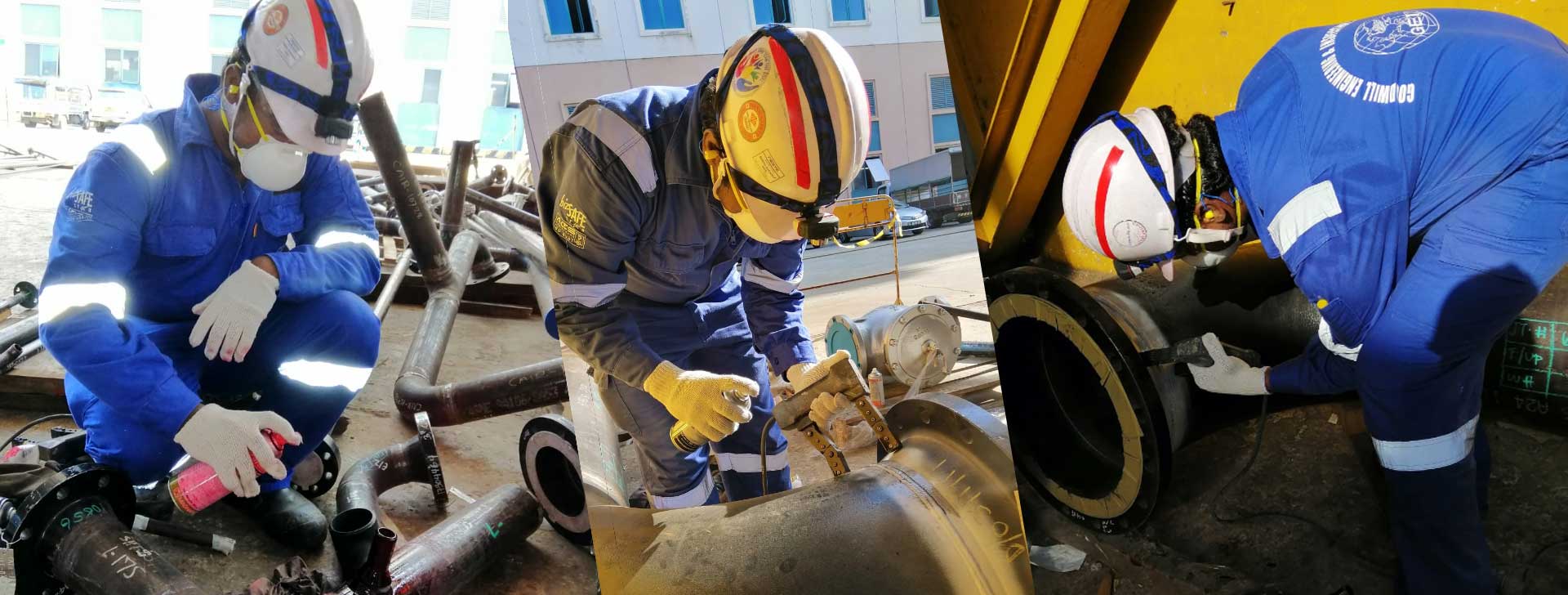
ASNDT
These courses do not have fixed duration and programs, depending on the requested qualification and on the entrance skill of the trainees, courses are developed starting with practical demonstrations and continuing with practical exercises increasing from time to time the degree of difficulty, courses are teached by Qualified Instructors. RTCS has developed different training programs, suitable for people who want to increase their own skill and knowledge towards welder’s profession in several industrial sectors such as Oil & Gas, Off and Onshore industries, Infrastructures, Transportation (automotive, shipyards, railways, aerospace) welded components production, and others.
Dye Penetrant Testing (DPT)
It includes basics of penetrant testing, penetrant groups, pre-cleaning methods, penetrant removal techniques, types of developers and application procedures, inspection procedures, sensitivity & resolution concepts, accessories and types of discontinuities.
Level ll course outline
- Selection of techniques.
- Manufacturing processes and discontinuities.
- Interpretation of indications.
- Preservation of indications.
- Evaluation of test materials.
- Penetrant materials quality control.
- Codes, standards and procedures.
Magnetic Particle Testing (MPT)
It includes basics of magnetism, magnetization techniques, types of currents, inspection mediums, inspection techniques, test equipment’s & accessories, demagnetization, types of indications, manufacturing processes and types of discontinuities.
Level II course outline
- Selection of Techniques.
- Codes, standards and Procedures.
- Acceptance Standards.
- Manufacturing Process and Discontinuities.
- Interpretation of Indications.
- Preservation of Indication.
- Evaluation of Test Equipment.
Radiography Testing (RT)
It includes nuclear physics, interaction of radiation with matter, shielding, radiation detectors, biological effects, radiation protection, basic safety rules, sources of radiation and their characteristics, film construction and film processing.
Level II course outline
Review of Level-I
- Non-conventional Radiography
- Techniques in radiography
- Codes, standards and Procedures
- Acceptance Standards
- Manufacturing processes and discontinuities
- Interpretation of Radiographs
RT Level 2 Practical Training
- Same as level-I + Interpretation, evaluation of Radiographs, recording of test results and preparation of test reports.
Ultrasonic Testing (UT)
It includes properties of sound waves, generation of ultrasound, interaction of ultrasound with matter and boundaries, types of probes, test techniques, test equipment, instrumentation, test variables, inspection procedures and types of discontinuities.
Level II course outline
- Review of Level I Course
- In-depth study of test Variables
- Immersion Techniques.
- Principles of DAC Methods.
- Echo dynamics for Reflector Evaluation.
- Codes, standards and Procedures.
- Acceptance Standards.
- Evaluation of Test Equipment.
- Manufacturing Process and Discontinuities.
UT Level 2 Practical Training
Same as for Level 1 course + Interpretation, Evaluation of Indications using DAC. Evaluation Methods and Echo Dynamics, Beam Profile and Plotting.
LEVEL II PRACTICAL TRAINING
Ultrasonic thickness testing of pipes, tubes, hollow machined components, castings, plates and corroded parts.
